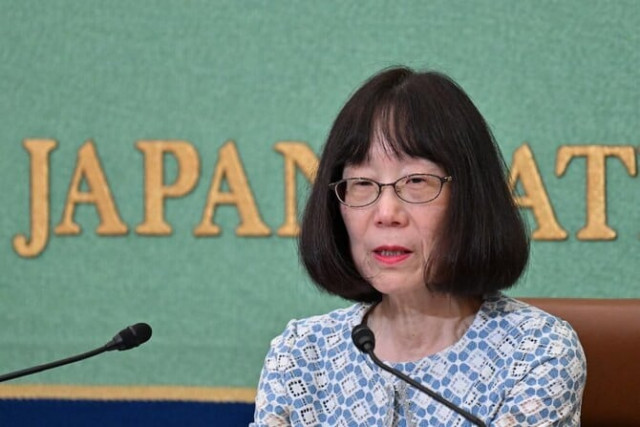ICC president warns attacks from US, Russia threaten court's survival
US politicians are threatening to sanction court officials over the arrest warrant against Israel’s Benjamin Netanyahu

The president of the International Criminal Court (ICC) has issued a stark warning that ongoing attacks on the tribunal by the United States and Russia “jeopardise its very existence.”
In her address to ICC members at an annual conference in The Hague on Monday, ICC President Tomoko Akane condemned the “coercive measures, threats, pressure, and acts of sabotage” directed at the court. Though she did not name the countries involved, her remarks were a direct reference to the two major powers, which have criticised the court after it issued arrest warrants against officials from Israel and Russia.
Akane told the conference, “The court is being threatened with draconian economic sanctions by another permanent member of the Security Council as if it was a terrorist organisation.”
Threats from Washington over Israeli arrest warrants
The United States has strongly objected to the ICC’s actions, particularly after it issued arrest warrants for Israeli Prime Minister Benjamin Netanyahu and former Defence Minister Yoav Gallant over alleged war crimes in Gaza. In response, US politicians have proposed sanctions on ICC officials.
Senator Lindsey Graham, who will hold significant power in Congress starting in January, labelled the ICC a "dangerous joke" and threatened to penalise any country cooperating with the tribunal. “To any ally – Canada, Britain, Germany, France – if you try to help the ICC, we’re going to sanction you,” Graham declared on Fox News.
In June, the Republican-controlled US House of Representatives passed a bill to impose sanctions on the court after ICC Prosecutor Karim Khan requested the arrest warrants for the Israeli officials. However, the bill has not yet been considered by the Senate, which is still under Democratic control.
Further escalating tensions, US Senator Tom Cotton suggested using military force against the court following the ICC's issuance of the arrest warrants.
Russia’s retaliation over Ukraine war crimes warrants
Russia, meanwhile, has also reacted strongly to the ICC’s actions. In November, Moscow issued an arrest warrant for ICC Judge Haykel Ben Mahfoudh, and previously indicted Khan and other officials after the court issued warrants for President Vladimir Putin and senior Russian military leaders over alleged war crimes in Ukraine.
Akane condemned these efforts as “appalling” and warned that attempts to undermine the court’s authority would set a dangerous precedent. “The fall of the court would imply the fall of the rule of law in the international community,” she said. “Victims would no longer be able to obtain justice. For many of them, a world without the ICC is inconceivable.”
ICC’s role in upholding international law
The ICC, established in 2002, is tasked with prosecuting war crimes, crimes against humanity, genocide, and the crime of aggression when member states are unwilling or unable to do so themselves. Its decision to issue arrest warrants for Israeli leaders marked the first time the court had taken such action against a staunch Western ally.
Akane reaffirmed the ICC's commitment to its mission, saying, “We firmly reject any attempt to influence the independence and the impartiality of the court.” The ICC remains one of the most important international bodies for holding individuals accountable for the gravest atrocities, yet its independence is under increasing pressure from powerful nations.
US politicians are threatening to sanction court officials over the arrest warrant against Israel’s Benjamin Netanyahu
The president of the International Criminal Court (ICC) has warned that attacks on the tribunal, which have come largely from Washington and Moscow, “jeopardise its very existence”.
Addressing ICC members in The Hague at an annual conference on Monday, ICC President Tomoko Akane said the court faced “coercive measures, threats, pressure and acts of sabotage” without naming the United States and Russia.
The court has been facing rebukes from the two countries after issuing arrest warrants for Israeli and Russian officials over wars in Gaza and Ukraine.
“The court is being threatened with draconian economic sanctions by another permanent member of the Security Council as if it was a terrorist organisation,” Akane said in her address.
US politicians have been threatening to impose sanctions on ICC officials after the tribunal issued arrest warrants against Israeli Prime Minister Benjamin Netanyahu and his former Defence Minister Yoav Gallant over suspected war crimes in Gaza.
Last month, US Senator Lindsey Graham, whose Republican Party will be in control of both houses of Congress and the White House starting in January, called the ICC a “dangerous joke” and threatened penalties against the court and any country that cooperates with it.
“To any ally – Canada, Britain, Germany, France – if you try to help the ICC, we’re going to sanction you,” Graham said on Fox News.
In June, the Republican-controlled US House of Representatives passed a bill to sanction the court in response to ICC Prosecutor Karim Khan’s request for the arrest warrants against Israeli officials.
The measure has so far not been considered by the Senate, which at this point is controlled by Democrats.
After the ICC issued arrest warrants for Netanyahu, Gallant and a Hamas leader last month, US Senator Tom Cotton suggested using military force against The Hague-based tribunal.
The US and Israel are not members of the ICC, and they have rejected the court’s investigations of alleged abuses in Gaza and the occupied West Bank.
However, the court has ruled that it has jurisdiction in those areas because the State of Palestine is a signatory to the Rome Statute, which established the tribunal.
“The court has been subjected to attacks seeking to undermine its legitimacy and ability to administer justice and realise international law and fundamental rights – coercive measures, threats, pressure and acts of sabotage,” Akane said.
She called the efforts “appalling”.
Last week, the court decried the “recent issuance of arrest warrants aimed at threatening the liberty and integrity of two judges”. Russia had issued an arrest warrant for ICC Judge Haykel Ben Mahfoudh in November.
Moscow also previously indicted Khan and other court officials after the ICC issued arrest warrants for President Vladimir Putin and Russian military leaders last year over alleged war crimes committed during Russia’s invasion of Ukraine.
Akane warned on Monday that the fall of the court through these threats would “imply the fall of the rule of law in the international community”.
“Victims would no longer be able to obtain justice. For many of them, a world without the ICC is inconceivable,” the ICC president said.
“We firmly reject any attempt to influence the independence and the impartiality of the court,” she added.
The ICC was established in 2002 to prosecute war crimes, crimes against humanity, genocide and the crime of aggression when member states are unwilling or unable to do so themselves.
Its warrant against the Israeli leaders marked the first time the court issued an order for a staunchly close Western ally.



















COMMENTS
Comments are moderated and generally will be posted if they are on-topic and not abusive.
For more information, please see our Comments FAQ